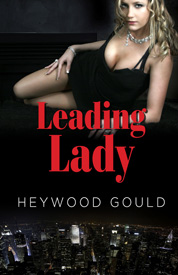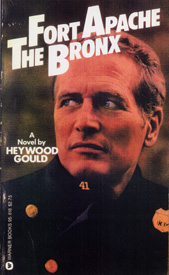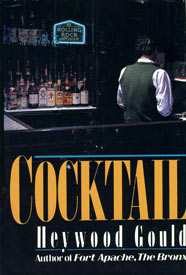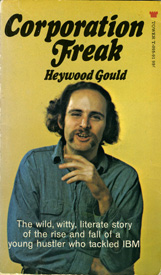Tag Archive for 'THE BRONX'
INTERVIEW
Heywood Gould Interviews Heywood Gould
Why are you doing this interview?
To promote my new book The Serial Killer’s Daughter.
Why should people buy your book?
To generate enough sales so I can publish another one. And maybe get a movie deal.
Let me rephrase the question: with so many books available why should people buy Serial Killer’s Daughter?
Because if won’t do me any good if they buy somebody else’s book, yo…
Okay. What’s special about Serial Killer’s Daughter?
It’s a sexy, suspenseful thriller that will keep you guessing at every turn, while providing a life affirming, redemptive, poetic exploration of man’s place in the universe.
So you have moderately good sales. What happens next?
I raise my profile in the market place. I e mail a hundred publishers and accept the least insulting advance. My next book drops stillborn from the press with no advertising and no book tour unless I pay for one myself. I drive hours to a signing attended by an old lady on a walker who thought she was coming for Mary Higgins Clark and a homeless guy who eats all the cupcakes. A producer calls, full of extravagant praise, although he’s only skimmed the three page “coverage” written by his assistant who read the book after being stood up by a Match. com date. I give him a free option for twenty years or the term of my natural life, whichever comes first.
That doesn’t sound so great..
It is for me and for the people around me. Consider the alternative. The book bombs. No publishers, no producers. I sit in the dark in my underwear, muttering imprecations. I become a burden on family and friends. Vast sums are spent on pharmaceuticals…
If your book doesn’t sell will you be able to muster the energy to write another one?
Oh sure. Writing is a compulsion, not a profession. I’ve been doing it since I was six and will continue until the day I die. I’m just lucky I can make a living at it. But repeated failure will cause me to doubt myself. Have I dried up? Has age taken its toll? I’ll write and rewrite, first the same page, then the same sentence, the same word. I’ll be attacked by punctuation anxiety. They’ll rush in to find me rolling on the floor screaming. “A comma…You idiot, it’s a semi-colon…No, goddamit, a comma…”
How about a brief biographical sketch.
I only recall fragments and images from my childhood.
Fine, give me fragments.
At the end of long dark hallway in my grandmother’s apartment in the Bronx a monster lurks waiting to eat me. My aunt’s false teeth are in a jelly jar on the bathroom sink. A memorial candle for my grandfather flickers in the kitchen. I see his ghost’s shadow flitting along the walls. A kid in a sandbox is raising a toy shovel and hitting me in the head. I open the bedroom closet and find my mother, hiding among the coats, sobbing…
Can we move on?
My adolescence is devoted to basketball and self-abuse; the sport changes to baseball during the summer. As I get older I diversify my self-abuse to include, alcohol, drugs, pathetic attempts at seduction, frustration at not being able to write a simple short story like Chekhov…
Thank you, I think we’re okay on biography. Can you give us a brief synopsis of Serial Killer’s Daughter?
I’ll let Peter Vogel, the protagonist describe the book. After all, he lived through it, not me…Take it away, Peter
This is so typical of me. I make a sex- for term papers- deal with a whacko chick in my American Lit. class. She sticks around just long enough to make me fall crazy in love with her, then disappears. Six months later she’s back like nothing happened. But then the weirdness starts. My apartment is invaded. Bodies are found in a dumpster. Thugs try to run me off the road. One night she confesses: she’s the daughter of a notorious serial killer, doing life in a super max for eleven murders. Somebody is trying to kill her and I’m the only one who can protect her. But now they’re after me, too. They stalk us on the road, in hotels, everywhere. The cops don’t believe us. They think we’re renegade drug mules being hunted by the cartel. I get so freaked out I kill a dude who’s been tailing us. So now I’m on the run. Our only chance is to figure out who’s after us and get them first. And the only person who can help us is her dad.
Sounds like a thriller.
It’s a thriller wrapped up in a mystery. But it’s really a love story.
Covering all bases?
I’m trying to break into the cosy market.
Is this book autobiographical?
Yes, except for the sex scenes.
Can you describe the book in one word?
It’s a warning.
About what?
About hot women—they’re always in trouble.
About getting what you wish for—you pay plenty and you’re always disappointed. About trying to save someone’s life—you won’t and the bad guys will come after you as well.
About commiting murder—it’s easier than it seems.
About criminals—they never feel guilty
About cops—they see a guy with a beautiful woman they want to throw him in jail.
About the world—it’s an unjust, capricious, place. Stay indoors as much as possible.
That’s pretty bleak.
Really? I think it’s positively Buddhist. Once you cleanse yourself of all passion, ambition and illusion, you can begin to find peace…only if you have abandoned all hope…
Okay, I get it. Let’s talk about your career.
My career has been a series of lucky encounters. A guy I met in Greenwich Village told me they needed copy boys at the NY Post. A man from IBM came into my office by mistake, then mistook me for someone else and hired me as a consultant. A woman I talked to on a bus was an editor at a paperback publishing house. A guy I played poker with was a producer for the TV show NYPD. An agent I knew had two partners looking for someone to write a cheap script about two cops in the South Bronx. A friend’s upstairs neighbor worked with Bill Devane who needed a rewrite for a movie called Rolling Thunder.
Didn’t talent have anything to do with it?
If you factor talent into the equation how do you explain the no-talent bums who are doing so much better than you?
Okay, so it’s all coincidence and luck and who you know. Does that mean there are geniuses out there whose work has never been discovered?
And never will be.
Well, that’s encouraging.
Oh it is. You see it’s so much easier to accept failure when you see life as a series of random collisions…
Thank you. I think we’re covered on the zen fatalism. You were involved in some pretty glamorous Hollywood projects. That must have been fun.
Oh yeah, laughs galore.. On Fort Apache the Bronx I was called a racist and chased down the street. Then, sued by a cop who said I stole his script. Then somebody posted a slanderous Wikiipedia piece about the movie
Everybody loves Cocktail now, but it was slammed so badly by the critics that I took to my bed for three days. I still meet people who say, “how could you destroy your own novel?” And I say, “what do you want me to do, send the fucking check back?”
One Good Cop was…
I think I get your drift. What’s your new book about?
A bitter writer wreaking horrific vengeance on people who exploited him…
Is it autobiographical?
Of course not. What would give you that idea?
Any place we can get a drink around here?
You buying?
For the original interview and other author’s interviewing themselves visit:
http://nigelpbird.blogspot.com/2011/07/dancing-with-myself-heywood-gould.html
Please join us for a Release Party & Book Signing
May 5, 2011 6:30 – 8:00
Mysterious Bookshop, 58 Warren St, NYC, NY 10007
LIBRARY JOURNAL
Gould, Heywood. The Serial Killer’s Daughter. Nightbird. Apr. 2011. c.258p. ISBN 9780981957258. $25.
After a major hiatus (one book since 1988), novelist Gould (Fort Apache, the Bronx; Cocktail) is back with a noir thriller, full of action, dark humor, multiple killings and a swath of eccentric characters plucked from the American heartland (bungling bad guys, a lawyer of dubious sanity, and a reverend with a unique take on eternal damnation). The story involves Hannah, the daughter of an incarcerated serial killer, who fears for her life. She ensnares Peter, a hormonally charged and quip-literate English major, as protector. Since English majors are more renowned for parsing sentences than defending princesses, this is a stretch. But the unlikely hero fulfills his role with aplomb, dark humor, lethal efficiency, luck and his repertoire of weak jokes. The masterly scoop and delineation of the story has inherent cinematic fell, not suprising coming from a screenwriter and director.
VERDICT Apart from the clichéd sexual gambit, this high-caliber redemptive road trip is quick-witted, stylish, and highly entertaining.
– Seamus Scanlon, Ctr for Worker Education, CUNY
Dear Readers,
We have expanded our download capacity and can offer Leading Lady audiobook, Fort Apache, the Bronx, Cocktail and Corporation Freak for 99¢. Click on the link below.
http://heywoodgould.com/pages/?p=213
Sincerely,
Patricia



